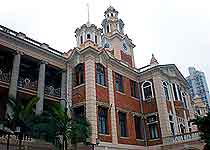Attration Category

The University of Hong Kong is the oldest tertiary institution in Hong Kong. Its motto is "Sapientia et Virtus" in Latin, meaning "wisdom and virtue", and in Chinese. The medium of instruction in most classes is English.[3]. The school adopts the problem-based learning teaching strategy which aims to train students' problem solving skills. It has a great achievement in Humanities, Legal subjects, Political science, Biological science and Medicine.
The HKU has high positions in various University rankings. According to QS World University Rankings 2011/2012, it was at 22nd in the world and the best in Hong Kong.[4] also Academic Rankings of World University Rankings ranked the University of Hong Kong as 201-300 in World and 3rd in Hong Kong. In another ranking, the 2011-2012 Times Higher Education World University Rankings cooperating with Thomson Reuters as the new data supplier since 2010, it was ranked 34th in the world, 2nd in Asia (after the The University of Tokyo).
The University of Hong Kong traces its origins to the former college, founded by the Chinese University in 1887 and would later become the Medical Faculty of the University of Hong Kong. The college is noted for being China's Father of the Nation Sun Yat-sen's alma mater.
The university was founded in 1911 when Governor Sir Frederick Lugard proposed to establish a university in Hong Kong to compete with the other Great Powers opening universities in China, most notably Prussia, which had just opened Tongji University in Shanghai. The colonial Hong Kongers shared British values and allowed Britain to expand its influence in southern China and consolidate its rule in Hong Kong.
Parsi businessman Sir Hormusjee Naorojee Mody learned of Lugard's plan and pledged to donate HK$150,000 towards the construction and HK$30,000 towards other costs. The Hong Kong Government and the business sector in southern China, which were both equally eager to learn "secrets of the West's success" (referring to technological advances made since the Industrial Revolution), also gave their support. The Swire Group also contributed funds, partly wishing to bolster its corporate image following the death of a passenger on board one of its ships, Fatshan, and the subsequent unrest stirred by the Self-Government Society.[5] Along with other donors including the United Kingdom government and companies such as HSBC, Lugard finally had enough to build the university.
Lugard laid the foundation stone of the main building on 16 March 1910 and hoped that the university would educate more Chinese people in British "imperial values", as opposed to those of other Western powers.
